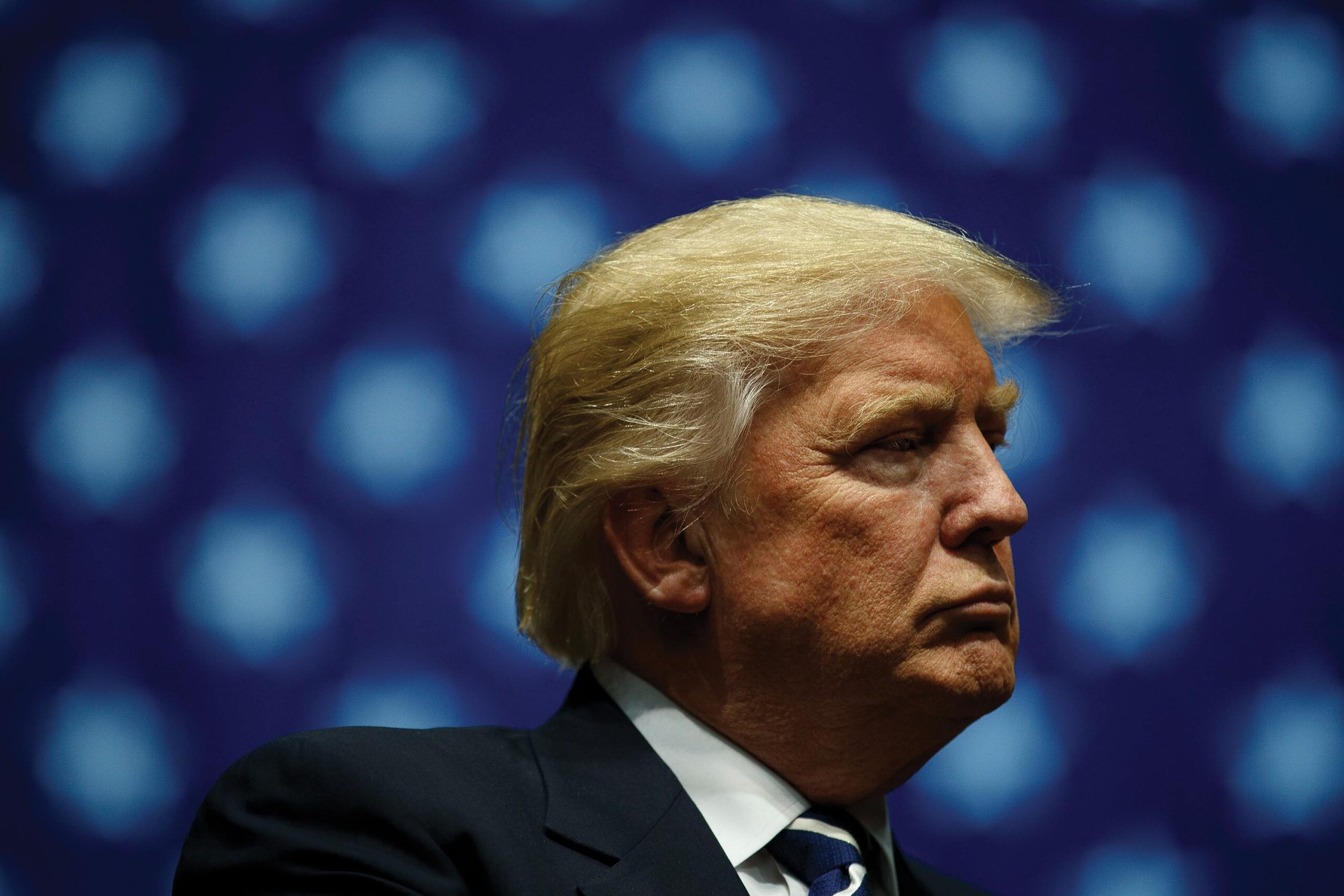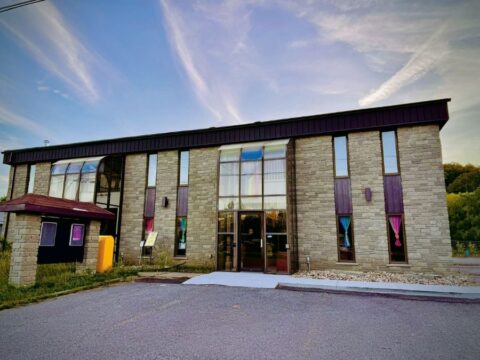On Nov. 9, 2016, the day after Donald Trump was elected to the U.S. presidency, the United Church of Christ issued a pastoral letter from its headquarters in Cleveland.
“This morning,” it began, “we wake up to a new reality. . . . As we gather to worship this weekend, we will find among us many who are celebrating the decision that was reached — and many who are mourning it. We are, by all measures, a deeply divided people.”
You may unsubscribe from any of our newsletters at any time.
The letter, in a tone that was even-handed, yet urgent, called upon its members to begin the work of healing.
The United Church of Christ, with nearly a million members gathered in over 5,000 congregations, is proudly diverse. While some of its congregations are largely African-American or Latino or gay, others are thoroughly mixed. Formed in 1957, the UCC (U.S.A.) is a union of Reform, Congregational and evangelical traditions, which boast an admirable history, going back to the 19th-century abolitionist movement, of standing up for civil rights, women’s rights, union workers’ rights and more.
Yet as Rev. John C. Dorhauer, the church’s general minister and president, points out, “To call the United Church of Christ the most progressive American Protestant denomination hides, somewhat, the fact that we have very conservative churches and conservative members in some of our more liberal congregations.”
Politically, UCC members fall pretty much within mainstream demographics. In a normal election cycle, Democrats, Republicans and independents would be represented proportionally; they would vote (or not) accordingly, and the divisions between them would seem unremarkable.
But American politics in recent years have been anything but ordinary. The checks and balances famously meant to protect American democracy from dangerous aberrations have fallen away, along with the unwritten standards defined by tradition, common decency and respect for facts. Specific events like 9/11, the invasion of Iraq, the war on terror, the financial meltdown of 2008 or the mutation of the Republican party into a blunt instrument of obstruction during Barack Obama’s presidency, to say nothing of the fracturing of public space by social media: all of these have disrupted the political landscape so profoundly that the Trump phenomenon has been able to sweep through it like a wildfire, devouring everything in its path.
To many, Trump’s victory felt as though not just the United States, but the entire world, was poised on the brink of unprecedented and unpredictable change.
The starker language in the pastoral letter –– its reference to “our deeply wounded and fiercely broken body” — seemed designed both to reflect the depth of this crisis and to cut through the fog of lies Trump’s campaign had stirred up. “Those who celebrate this election,” it said, “must show a humility that honors the pain of those whose dreams were dashed by the outcome. Those who grieve must find a courage and hope found in a faith not in earthly power, but in the redemptive love of our Risen Christ.”
It wouldn’t be surprising if these words resonated with United Church of Canada readers anxiously monitoring the shifting political landscape south of the border. The two churches are, in Dorhauer’s words, “deeply and spiritually compatible” thanks to their shared theology and commitment to social justice. For that reason, in 2015, the churches entered into a full communion partnership. It’s this close relationship, and the sense of crisis surrounding Trump’s election, that prompted The Observer to ask me to visit United Church of Christ congregations in the United States to learn more about how the denomination that had nurtured America’s first black president was responding to what the pastoral letter called “the new reality.”
Shortly before my early December departure, I watched an episode of Basic Black, a long-running WGBH Boston panel show. That evening, they were discussing ways in which faith-based communities might respond, especially in light of exit polls suggesting that 60 percent of white Catholic voters and over 80 percent of white evangelical Christian voters had cast their ballots for Trump. One of the panellists, syndicated columnist Rev. Irene Monroe, made an intriguing remark: she called Trump’s victory “a disastrous opportunity.” Her words stayed with me as I headed south.
‘Where does faith fit in, all of those lessons of Jesus, that we should turn the other cheek and forgive and so forth? How do we do that?’
Coral Gables Congregational United Church of Christ, Miami
The church building is a graceful Spanish Colonial Revival structure with a red-tiled roof, an imposing bell tower and a brilliant white faux-Baroque entrance portal. Standing in that portal, you can look down a long alley of royal palms to the Biltmore hotel, a famous Jazz-age destination for gangsters, movie stars and socialites. Not much has changed since both buildings went up in the 1920s, and it wasn’t hard to imagine the ghosts of Al Capone or Johnny Weissmuller nursing hangovers at one of the hotel bars while the parishioners filed into the church for Sunday worship.
The service that day was both familiar and strange, a traditional Advent worship service with modern elements blended in. The effect was calming, even reassuring. Without ever being explicitly political, it managed to convey the central message of the pastoral letter — a call to tolerance and unity — wrapped in the timeless appeal of words and music experienced communally.
Afterwards, while waiting to meet with senior pastor Rev. Laurinda Hafner, I mingled with members of the congregation at their annual German Christmas market. As I stood among the din of animated chatter, some of it in Spanish, I felt as though we were enjoying a temporary calm before the storm that was sure to come roaring back after Trump’s inauguration.
In one of the church’s meeting rooms, Hafner had gathered over a dozen people to talk with me about their responses to the election. It was a mostly white, well-educated group of men and women of various ages and backgrounds, all of whom were eager to share their ideas. The discussion that followed felt, at times, like a university seminar, where people struggled to be objective. In other moments, it had the confessional frankness of a group therapy session.
A man who had worked many years abroad worried that as nationalism spread across the globe — the Brexit vote in the United Kingdom, the rise of Marine Le Pen in France, Trump’s victory in America, Beijing flexing its muscles in the South China Sea — a single bad or impulsive decision could have dangerous consequences. A visiting professor of political science at Miami University remarked that the situation was bad, but not as bad as it had been in interwar Europe, with the rise of fascism and communism. “To me,” he said, “it’s a wake-up call. It’s tragic, but it’s not the end of the world.”
Others reflected his cautious optimism. “The thing I’m seeing,” one woman said, “is that people are realizing they can’t take anything for granted. They’re looking for opportunities to come together and make change, to be a voice, and that’s a very positive outcome along with all the negative things.” But, she admitted, people are frightened. As a gay woman, she worried that her recently acquired right to marry might be taken away. Before the election, she had assumed that things were simply going to go on getting better. Now, she said, she’d been too complacent.
Another woman, picking up on that idea, talked about how the social progress liberals had thought was so secure happened too quickly for some to absorb. It was important, she said, to get inside the brains of people who were not quite ready to accept openly gay people, for instance. “They are well-meaning,” she said, “and they’re not necessarily homophobic, but they’ve seen their world change, and they don’t know where they fit into it. So it’s a matter of listening to that, to understand how we can make progress for everybody to be included in this vision.”
I asked them to comment on something the novelist Dave Eggers had written recently: “Having one’s president behave worse than anyone you know is wounding to the soul.” The quote elicited a buzz of appreciation.
“There are some real challenges to our faith in all of this,” Hafner said. “Where does faith fit in, all of those lessons of Jesus, that we should turn the other cheek and forgive and so forth? How do we do that? How do I, as your pastor, call you to that better self and to those lessons of faith when I’m struggling with it as well? I think we’re all going to need each other as we go through this.”
Of all the comments, the most moving and revealing came from the only black woman in the group: “We sit here talking, and we think we have it bad, each one of us, in our own life,” she said. “We think that love can conquer all, but unfortunately, in a society of so much hate right now, it’s not working. We forget that these things have got to unfold. And it’s going to get worse. You have to tap into that faith to walk in these times, and they’re hard. They’ve always been hard. It’s just that it’s getting harder for the people who’ve never seen hard.”

United Church of Christ headquarters, Cleveland
After the lush warmth of Miami, Cleveland was cold and windswept. Like many places that have seen more prosperous days, the city feels bigger than it is. The downtown is criss-crossed with broad avenues and wide sidewalks overshadowed by massive office blocks, many of them monuments to an era when the steel industry was thriving.
One of the newest buildings is “The Q” — the Quicken Loans Arena — where Trump was officially nominated last July. From there, a 10-minute walk down Ontario Street brings you to one of the oldest buildings in the city, the Presbyterian Old Stone Church, built in 1834. In 1865, the body of President Abraham Lincoln lay in state outside the church while mourners, including some of Lincoln’s family, held a packed funeral service inside. The ironies of that juxtaposition scarcely bear thinking about. From Lincoln to Trump, no Republican has ever won the White House without winning Ohio.
The United Church of Christ headquarters are in the city centre, not far from The Q. My first conversation was with John C. Dorhauer, who is in charge of keeping his extensive and sometimes fractious denomination together. A former pastor, Dorhauer is used to the challenge of leading congregations where he was theologically more liberal than his flock. “In a denomination like ours, where we prize freedom of the pulpit, pastors who function in churches with that theological and political divide have to constantly find the balance,” he said. “Now, Trump has changed the game for them.”
I asked him in what way.
“Trump’s bald, audacious, offensive rhetoric is something we’ve never seen before,” he replied. “We have female clergy who are traumatized by seeing a man elected who consistently degraded them on the campaign trail. We have immigrant communities who are literally now in fear for the families who populate their churches. We have clergy who have formed deep relationships with their Muslim partners in their communities, who are actively now on the front lines defending them in ways they never imagined they would have to before. And so it’s changed the game.”
He continued, “One of the ways I frame this is that we’ve always had voices like Donald Trump’s. The election of Donald Trump is not about Donald Trump. It’s about a discovery that America wants to be something we didn’t think America ever wanted to be.”
It had always baffled me that the Republicans were able to gain such traction among so many Americans of faith by promising, for instance, to repeal Obama’s Affordable Care Act. Wasn’t universal health insurance a very Christian idea?
I put the question to another signatory of the pastoral letter, Rev. Traci Blackmon, who, before becoming executive minister in charge of the UCC’s Justice and Witness Ministries, worked as a registered nurse. Now she divides her time between Cleveland and Florissant, a suburb of St. Louis, where she is senior pastor of Christ the King United Church of Christ, a largely African-American congregation.
“This is not a Christian nation,” Blackmon replied emphatically. “It’s a religious nation, you know what I’m saying? People have taken pieces that suit their personal needs from sacred texts and created for themselves this image of what God is and what God means. What we’re talking about here is a theology of chosenness.”
If people see God as being on their side, she explained, then it’s easy to see the struggles of others as being their own fault. “I think that’s what slavery is all about. There’s no way that, as a Christian person, you can have slaves, unless you found some way to justify, through sacred texts, that it is God’s will that you be superior. So if you can do that in your mind, and decide that the things you’ve achieved in life, the benefits that you’ve gotten in life, . . . the fact that you have insurance, the fact that you have a home — if you can connect those things to your favour in God’s sight, you can also justify why other people don’t have that.”
I felt I was hearing a very old idea in a radically new context. It was all a matter of shifting one’s perspective. The Bible, in Blackmon’s view, is the story of a people on a journey to find God. It’s a story that can apply to all people. It’s The Pilgrim’s Progress. It’s Everyman. But if you flip it, you get a story about a God seeking out and choosing a particular people. In that version, you get winners and losers, people who have God on their side and people who don’t. Trump is an avatar of the theology of chosenness, a poster boy for the gospel of prosperity. “We have to commit to deconstruct the theology of chosenness, the theology of capitalism as being Godly,” Blackmon said, “and it’s going to be a long road.”
Did she think Trump’s victory could galvanize the churches to stand up to him?
“I believe that’s true, but it doesn’t make the pain of this moment any less, right?” she said. “I’m a witness that God works in mysterious ways, and I know fully well that God has abandoned neither myself nor Mr. Trump. So I think that something will emerge here and that we will be stronger for it, because we have to be. It’s not just about lamenting and moaning, but it’s also about how we’re going to strategize to build our coffers in such a way that when people come to us, we can help.”

Trinity United Church of Christ, Chicago
My final stop was Chicago, where I planned to revisit Obama’s old church, Trinity United Church of Christ. I’d written a story about it for this magazine in 2008, and I wanted to see what the mood was like eight years on, with Obama’s nemesis poised to take over the White House.
But first, I sought out Linda Thomas, whom I had interviewed for that story. Thomas is a professor of anthropology and theology at the Lutheran School of Theology at Chicago. In the early spring of 2008, during the presidential primaries, Obama had withdrawn from Trinity and broken with his mentor — Trinity United’s senior pastor emeritus, Rev. Jeremiah Wright Jr. — because some of Wright’s statements, taken out of context, seemed stridently rabble-rousing and could have hurt Obama’s run for the Democratic nomination. In the media frenzy that followed, the church’s new senior pastor, Rev. Otis Moss III, asked Thomas to be a spokesperson for the church.
When Thomas and I met this time, at a Middle Eastern restaurant not far from her school, I was still mulling over my experiences and conversations in Miami and Cleveland. Was I right in thinking that there was a unique complexity and toughness in the black response to Trump, one that had deep historical roots, one we needed to understand if we were to appreciate the full impact of Trump’s election?
Yes, Muslims, immigrants, women, those in the LGBTQ community and environmentalists all have specific reasons to worry. To the extent that Trump threatens to gut democratic institutions, undermine the media’s credibility and upend foreign policy norms, we all do. But the journey of black Americans has been particularly long and hard, and although Trump may represent a terrible setback, to black congregations he is not a surprise. As Imam Taymullah Abdur-Rahman, a Muslim chaplain at Harvard University, said on that Basic Black episode last November, “You hear a lot of white people saying, ‘This is a wake-up call,’ but the black and brown people are looking around and saying, ‘Good morning! We been awake!’”
Thomas never responded to my question directly, though I realized afterwards that our whole wide-ranging conversation was her answer. She talked of her visceral response to Trump and how he had “triggered this demon” in people. At the same time, she recognized that many of his followers had genuinely suffered during the last eight years. She had predicted that Trump was going to win, but when he did, she broke out in shingles, as though she were rejecting the man with her whole body. She sought solace in something Moss had said in a sermon: “God will not be trumped.”
I reminded her of what she’d told me in 2008: “I believe that God is working the healing of the nation through Trinity United Church of Christ. This church has put forth a presidential candidate. And we believe he will win.” She turned out to have been right then too, at least about Obama’s victory. Healing the nation from the plague of racism has proven to be a much taller order.
On my final day, I went to the 11 a.m. worship service at Trinity UCC in Chicago’s South Side. A bitter wind was filling the sidewalks and roadways with snow, and the large sanctuary was less than half full. Compared to the lush, celebratory feeling of the service I attended in 2008, this one felt spare, pared down, more intense and much more political. The modern dance number (a regular feature of worship at Trinity) had a hard, unsettling edge. Four male dancers in white masks crouched in the background, then prowled like predators among the female performers, who appeared to be trying desperately to break free from invisible shackles.
The sermon delivered by Rev. Stacey Edwards-Dunn, the church’s executive minister of community engagement and transformation, was a virtuoso performance, filled with colourful political commentary laced with explicit references to Trump. “You and we, we’ve been here before,” she said in her peroration. “This is not the first time that you’ve been between a rock and a hard place. And if God walked you through before, if God walked us through slavery, if God brought us through racist presidents before, if God brought us through Jim Crow and other situations that oppressed us, I am crazy enough to believe that God can, and that God will, do it again. We will just have to wait upon the Lord.”
For UCC members, “waiting” has never meant “doing nothing,” and in the surge of opposition after Trump’s inauguration, the church made no secret of how it felt about some of the executive orders spewing out of the White House. Senior church officials, including Dorhauer, joined 2,000 other U.S. faith leaders in condemning the late-January ban Trump imposed on travellers from seven Muslim countries and anyone seeking sanctuary in the United States as a refugee. In a letter to the president and members of Congress, they declared that Trump’s orders “fly in the face of the very principles the nation was built upon, contradict the legacy of leadership our country has historically demonstrated, and dishonor our shared humanity.” The equanimity of the UCC’s post-election pastoral note has given way to a defiance that is sure to grow.
The UCC joined the rest of the world in working to ensure that this “disastrous opportunity” would not become a disaster, plain and simple.
This story first appeared in the March 2017 issue of The Observer with the title “Called to resist.”














